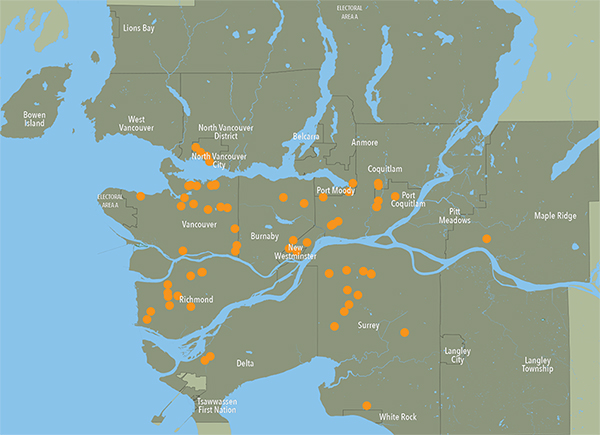Metro Vancouver Housing Market: Slower Rent Growth, But Costs Still Climbing

Table of Contents
Slowdown in Rent Growth: A Temporary Lull or a Shifting Trend?
Recent reports indicate a decrease in the rate of rent increases in Metro Vancouver, offering a glimmer of hope for renters. However, it's crucial to analyze this slowdown carefully to determine whether it signifies a long-term trend or a temporary reprieve.
Analyzing Recent Rental Data
Several sources, including the Canada Mortgage and Housing Corporation (CMHC) and local real estate boards, point to a moderation in rent growth.
- Rent increases across property types: While specific percentages vary depending on the source, reports suggest rent increases for apartments have slowed to around 2-3% annually in some areas, down from the double-digit increases seen in previous years. Condo and townhouse rental increases have also shown a similar trend.
- Geographical variations: The slowdown in rent growth isn't uniform across Metro Vancouver. Downtown Vancouver and other high-demand areas still experience higher rental costs and potentially slower decreases in growth rates compared to the surrounding municipalities. Areas like Surrey and Langley might show more significant slowdowns.
- Contributing factors: Several factors contribute to this apparent slowdown. Increased rental supply in some areas, due to new construction projects (although still insufficient to meet demand), and economic uncertainty affecting renter demand are likely contributors. The impact of rising interest rates on potential homebuyers also plays a role, as some individuals may choose to rent longer rather than purchase a home.
Home Prices Remain Elevated: Affordability Remains a Major Challenge
Despite the potential economic slowdowns and a cooling housing market in some other parts of Canada, home prices in Metro Vancouver remain stubbornly high, presenting a significant affordability challenge for many.
Persistent High Home Prices
Several factors explain this persistent high cost of homeownership in Metro Vancouver:
- Limited housing supply: The chronic undersupply of housing continues to be a primary driver of high prices. The gap between supply and demand remains vast.
- Interest rate impact: While rising interest rates have cooled the market somewhat, they have also made mortgages more expensive, impacting affordability and potentially slowing the rate of price increases rather than causing significant drops.
- Demand from domestic and international buyers: Strong demand from both domestic and international buyers continues to put upward pressure on prices. Competition for available properties remains intense.
- Average home prices: Average home prices in Vancouver remain significantly higher than in most other Canadian cities. West Vancouver, Point Grey, and Shaughnessy consistently rank among the most expensive neighbourhoods in Canada.
Factors Influencing the Metro Vancouver Housing Market
Understanding the Metro Vancouver housing market requires considering various interconnected factors.
Economic Conditions
The current economic climate plays a significant role in shaping the housing market's trajectory.
- Inflationary pressures: High inflation significantly increases the cost of construction and building materials, impacting both rental and home prices.
- Job growth and demand: Robust job growth in certain sectors can fuel housing demand, putting upward pressure on prices. Conversely, economic downturns can dampen demand.
- Immigration: Immigration continues to significantly contribute to the demand for housing in Metro Vancouver.
Government Policies and Regulations
Government policies and regulations have a substantial impact on the housing market's performance.
- Effectiveness of government initiatives: While various government initiatives aim to increase housing supply, their effectiveness in addressing the scale of the housing crisis remains a subject of ongoing debate.
- Future policy changes: Future policy decisions regarding taxes, zoning regulations, and building permits will significantly shape the future of the Metro Vancouver housing market.
Market Speculation and Investor Activity
Speculation and investor activity also play a role in influencing housing prices.
- Foreign investment: Foreign investment in Metro Vancouver real estate continues to be a factor, contributing to demand.
- Short-term rentals: The proliferation of short-term rentals, such as those facilitated by Airbnb, can reduce the long-term rental housing stock.
Conclusion
While rent growth in Metro Vancouver has shown signs of slowing, the overall cost of housing remains a significant barrier for many residents. High home prices, limited supply, and various economic and policy factors continue to influence the market's trajectory. Understanding these dynamics is crucial for both renters and prospective homebuyers.
Call to Action: Stay informed about the ever-evolving Metro Vancouver housing market. Regularly check reliable real estate resources for the latest data and analysis on rent prices, home prices, and market trends to make informed decisions about your housing needs. Monitor updates on government policies affecting the Metro Vancouver housing market to better understand the challenges and opportunities presented by this dynamic and complex market.

Featured Posts
-
 Unexpected Encounter Trump And Zelensky Meet Before Popes Funeral
Apr 28, 2025
Unexpected Encounter Trump And Zelensky Meet Before Popes Funeral
Apr 28, 2025 -
 Investing In The Future The Countrys Promising Business Hubs
Apr 28, 2025
Investing In The Future The Countrys Promising Business Hubs
Apr 28, 2025 -
 9 Revelations From Times Trump Interview Annexing Canada Xi Jinping And Presidential Term Limits
Apr 28, 2025
9 Revelations From Times Trump Interview Annexing Canada Xi Jinping And Presidential Term Limits
Apr 28, 2025 -
 Musks X Debt Sale New Financials Reveal A Transforming Company
Apr 28, 2025
Musks X Debt Sale New Financials Reveal A Transforming Company
Apr 28, 2025 -
 Ftc Appeals Activision Blizzard Acquisition Microsoft Deal In Jeopardy
Apr 28, 2025
Ftc Appeals Activision Blizzard Acquisition Microsoft Deal In Jeopardy
Apr 28, 2025
Latest Posts
-
 Red Soxs Shifting Lineup Impact Of Outfielders Return And Casas Lowered Spot
Apr 28, 2025
Red Soxs Shifting Lineup Impact Of Outfielders Return And Casas Lowered Spot
Apr 28, 2025 -
 Analysis Red Sox Lineup Changes Following Outfielders Return And Casas Demotion
Apr 28, 2025
Analysis Red Sox Lineup Changes Following Outfielders Return And Casas Demotion
Apr 28, 2025 -
 Updated Red Sox Lineup Casas Position Change And Outfielders Reinstatement
Apr 28, 2025
Updated Red Sox Lineup Casas Position Change And Outfielders Reinstatement
Apr 28, 2025 -
 Red Sox Lineup Outfielder Returns Casas Moves Down In The Order
Apr 28, 2025
Red Sox Lineup Outfielder Returns Casas Moves Down In The Order
Apr 28, 2025 -
 Triston Casas Continued Slide Red Sox Lineup Adjustment And Outfielders Return
Apr 28, 2025
Triston Casas Continued Slide Red Sox Lineup Adjustment And Outfielders Return
Apr 28, 2025
